| Listing 1 - 10 of 12 | << page >> |
Sort by
|
Book
ISBN: 9781786600301 9781786600295 1786600293 1786600307 Year: 2017 Publisher: Lanham Rowman & Littlefield International
Abstract | Keywords | Export | Availability | Bookmark
 Loading...
Loading...Choose an application
- Reference Manager
- EndNote
- RefWorks (Direct export to RefWorks)
The book brings together prominent scholars in phenomenology of place. Covering a range of issues from sacred places to embodiment and identity and from environmental art and architecture to limit places, the contributors explore theoretical foundations through thinkers such as Heidegger, Marion-Young, Husserl, and Leopold among others. Phenomenological method and description are brought to bear on concrete places such as rivers, the Himalayas, modern transit, sacred architecture and more. The book is accessible and pertinent to on-going discussions in human geography, architectural theory, environmental studies, and philosophy of place. Provocative and imaginative, the essays provide a much-needed look at the contributions of phenomenology to, as well as the role of place in, contemporary philosophical and environmental discussions.
Phenomenology --- Human geography --- Human territoriality --- Philosophy --- Human geography - Philosophy --- Human territoriality - Philosophy
Book
ISBN: 0713163852 9780713163858 Year: 1983 Publisher: London Arnold
Abstract | Keywords | Export | Availability | Bookmark
 Loading...
Loading...Choose an application
- Reference Manager
- EndNote
- RefWorks (Direct export to RefWorks)
Human geography --- Philosophy --- -Anthropo-geography --- Social geography --- Geografie --- Philosophy. --- Sociale en economische geografie --- Algemeen. --- Géographie humaine --- Philosophie --- Human geography - Philosophy
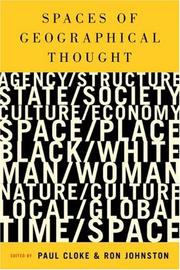
ISBN: 9780761947325 9780761947318 0761947329 0761947310 1446216292 9786610368969 1280368969 1412933927 1446224635 9781412933926 9781446216293 6610368961 9781446224632 9781280368967 Year: 2005 Publisher: London ; Thousand Oaks, Calif. : SAGE Publications,
Abstract | Keywords | Export | Availability | Bookmark
 Loading...
Loading...Choose an application
- Reference Manager
- EndNote
- RefWorks (Direct export to RefWorks)
Examining key ideas - like space and place - which inform the geographic imagination, this text discusses the core conceptual vocabulary of human geography.
Human geography --- Geographical perception. --- Géographie humaine --- Perception géographique --- Philosophy. --- Philosophie --- Human geography - Philosophy. --- Geographical perception --- Anthropogeography & Human Ecology --- Anthropology --- Social Sciences --- Philosophy --- Geografie --- Sociale en economische geografie --- Algemeen --- Algemeen. --- Anthropology. --- Géographie humaine --- Perception géographique --- Human beings
Book
ISBN: 9782701164830 2701164834 Year: 2013 Publisher: [Lieu de publication inconnu]: Belin,
Abstract | Keywords | Export | Availability | Bookmark
 Loading...
Loading...Choose an application
- Reference Manager
- EndNote
- RefWorks (Direct export to RefWorks)
Cet ouvrage s’intéresse aux lieux laissés vacants, avec le projet de débusquer le sens caché que recouvre leur mise à l’écart du jeu social. Il aborde leur « renaturation », qui leur confère une valeur mémorielle, ainsi que leur réaménagement ou leur restauration. Autrement dit, il s’essaie à décrypter le jeu subtil de l’oubli et de la mémoire qui s’y joue, entre enfouissement et résurgence. Parmi ces lieux, l’auteur examine particulièrement les friches et étudie celles-ci sous leurs multiples facettes : en référence à leur statut, qu’on les qualifie de rurales, urbaines, industrielles, militaires, touristiques… même si le plus souvent elles sont tout cela à la fois ; en rapport à leur durée, variable, car il en est d’immémoriales mais aussi d’éphémères, d’involontaires et de circonstanciées ; et au regard de leur finalité, au moment où elles sont réappropriées par des activités patrimoniales, touristiques… L’idée ici soutenue serait que les espaces délaissés deviennent des lieux de mémoire par le biais de leur réappropriation patrimoniale, dès lors qu’une recherche identitaire s’accommode de leur mise en tourisme. La friche est donc présentée ici comme un fondement de l’illusion mémorielle, une nostalgie du rétro ?
Human geography --- Waste lands --- Vacant lands --- Ruined buildings --- Géographie humaine --- Friches --- Terrains vagues --- Ruines --- Philosophy. --- Social aspects. --- Social aspects --- Philosophie --- Aspect social --- Réhabilitation de bâtiment --- Reconversion de bâtiment --- Philosophy --- Géographie humaine --- Human geography - Philosophy --- Waste lands - Social aspects
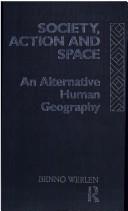
ISBN: 0415069653 0415069661 9780415069656 Year: 1993 Publisher: London Routledge
Abstract | Keywords | Export | Availability | Bookmark
 Loading...
Loading...Choose an application
- Reference Manager
- EndNote
- RefWorks (Direct export to RefWorks)
Human geography --- Methodology. --- Philosophy. --- -Human geography --- -Anthropo-geography --- Anthropogeography --- Geographical distribution of humans --- Social geography --- Anthropology --- Geography --- Human ecology --- Methodology --- Philosophy --- Geografie --- Sociale en economische geografie --- Algemeen. --- -Methodology --- Human geography - Methodology. --- Human geography - Philosophy.
Book
ISBN: 0521265401 0521109132 0511753225 9780521265409 9780521109130 9780511753220 Year: 1985 Volume: vol *5 Publisher: Cambridge Cambridge University Press
Abstract | Keywords | Export | Availability | Bookmark
 Loading...
Loading...Choose an application
- Reference Manager
- EndNote
- RefWorks (Direct export to RefWorks)
A work of outstanding originality and importance, which will become a cornerstone in the philosophy of geography, this book asks: What is human science? Is a truly human science of geography possible? What notions of spatiality adequately describe human spatial experience and behaviour? It sets out to answer these questions through a discussion of the nature of science in the human sciences, and, specifically, of the role of phenomenology in such inquiry. It criticises established understanding of phenomenology in these sciences, and demonstrates how they are integrally related to each other. The need for a reflective geography to accompany all empirical science is argued strongly. The discussion is organised into four parts: geography and traditional metaphysics; geography and phenomenology; phenomenology and the question of human science; and human science, worldhood and place. The author draws upon the works, of Husserl, Heidegger, Gadamer and Kockelmans in particular.
Geography --- Philosophy of science --- -Human geography --- -Science --- -Natural science --- Science of science --- Sciences --- Anthropo-geography --- Anthropogeography --- Geographical distribution of humans --- Social geography --- Anthropology --- Human ecology --- Cosmography --- Earth sciences --- World history --- Philosophy --- Human geography --- Science --- Philosophy. --- -Philosophy --- Aardrijkskunde. Filosofie. --- Phénoménologie --- Géographie. Philosophie. --- Fenomenologie. --- Normal science --- Earth Sciences --- Human geography - Philosophy. --- Geography - Philosophy. --- Science - Philosophy.
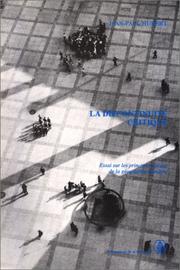
ISBN: 2859442294 2859448209 9782859442293 Year: 2014 Volume: 6 Publisher: Paris : Éditions de la Sorbonne,
Abstract | Keywords | Export | Availability | Bookmark
 Loading...
Loading...Choose an application
- Reference Manager
- EndNote
- RefWorks (Direct export to RefWorks)
Le monde est divers. La géographie cherche à comprendre cet état de fait. Dans cet effort, elle exprime la volonté de penser le monde habité d’une façon cohérente, de le penser comme étant organisé. Or, en avançant le concept d’organisation pour expliquer la diversité des paysages, la géographie introduit des a priori dans ses raisonnements. Elle présuppose que les lieux sont différents tout en étant solidaires, ce qui revient à dire que l’espace géographique doit être discontinu tout en étant unifié par des formes qui le structurent. Comment identifier ces formes qui synthétisent l’organisation objective de l’écoumène? Parmi toutes les singularités qui différencient l’espace terrestre, lesquelles permettent de reconstituer la réalité de ces morphologies? S’agit-il de trames physiques tissées par la répartition des ressources de la nature, de découpages territoriaux qui en régissent l’accès? Ou s’agit-il de discontinuités plus fugaces, naissant par exemple de la rencontre fortuite d’une ombre portée et d’un obstacle dressé, de discontinuités qui font converger dans une communion esthétique l’attention des sujets, comme si leur était présentée l’idée d’un intérêt supérieur, transcendant leurs besoins personnels ? Des théories s’opposent. L’auteur les appelle devant le tribunal de la Critique. Les candidats y exposeront leurs prétentions afin que soient jugées leurs capacités respectives à construire la représentation objective de l’organisation du monde et à atteindre l’explication théorique.
Human geography --- Human ecology. --- Philosophy. --- Human geography. --- Ecology --- Environment, Human --- Human beings --- Human environment --- Ecological engineering --- Nature --- Anthropo-geography --- Anthropogeography --- Geographical distribution of humans --- Social geography --- Anthropology --- Geography --- Human ecology --- Social aspects --- Effect of environment on --- Effect of human beings on --- Human geography - Philosophy. --- écologie humaine --- géographie humaine --- organisation --- discontinuité
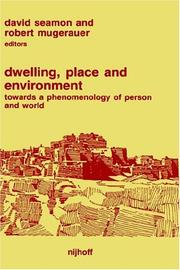
ISBN: 9024731925 9024732824 9401092516 9789024731923 Year: 1985 Publisher: Dordrecht Nijhoff
Abstract | Keywords | Export | Availability | Bookmark
 Loading...
Loading...Choose an application
- Reference Manager
- EndNote
- RefWorks (Direct export to RefWorks)
Human geography --- Human ecology --- Dwellings --- Phenomenology --- Philosophy --- Social aspects --- -Human ecology --- -Human geography --- -Phenomenology --- Philosophy, Modern --- Anthropo-geography --- Anthropogeography --- Geographical distribution of humans --- Social geography --- Anthropology --- Geography --- Ecology --- Environment, Human --- Human beings --- Human environment --- Ecological engineering --- Nature --- Domiciles --- Homes --- Houses --- One-family houses --- Residences --- Residential buildings --- Single-family homes --- Buildings --- Architecture, Domestic --- House-raising parties --- Household ecology --- Housing --- Effect of environment on --- Effect of human beings on --- Dwellings and society --- Society and dwellings --- Human geography - Philosophy --- Human ecology - Philosophy --- Dwellings - Social aspects
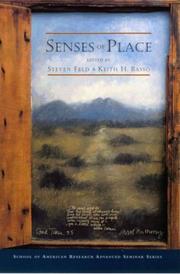
ISBN: 0933452950 0933452942 9780933452954 9780933452947 Year: 1996 Publisher: Santa Fe, N.M. School of American Research Press
Abstract | Keywords | Export | Availability | Bookmark
 Loading...
Loading...Choose an application
- Reference Manager
- EndNote
- RefWorks (Direct export to RefWorks)
The complex relationship of people to places has come under increasing scholarly scrutiny in recent years as acute global conditions of exile, displacement, and inflamed borders-to say nothing of struggles by indigenous peoples and cultural minorities for ancestral homelands, land rights, and retention of sacred places-have brought the political question of place into sharp focus. But to date, little attention has been paid to the ethnography of place, to how people actually live in, perceive, and invest with meaning the places they call home.In this compelling new volume, eight respected ethnographers explore and lyrically evoke the ways in which people experience, express, imagine, and know the places in which they live. Case studies range from the Apaches of Arizona’s White Mountains to the residents of backwoods “hollers” in Appalachia and the Kaluli people of New Guinea’s rainforests. As these writers confront the dilemmas and possibilities of an anthropological consideration of place, they make an important and moving contribution to our understanding of ourselves.
Ethnology --- Geographical perception. --- Human geography --- Philosophy. --- Ethnology. Cultural anthropology --- Sociology of culture --- Philosophical anthropology --- group identity --- Social geography --- human geography --- ethnicity --- Geographical perception --- #SBIB:316.334.5U13 --- #SBIB:39A4 --- Environmental perception --- Maps, Mental --- Mental maps --- Perceptual cartography --- Perceptual maps --- Perception --- Orientation (Psychology) --- Space perception --- Philosophy --- Sociologie van stad en platteland: sociale aspecten van de ruimte, sociale ecologie --- Toegepaste antropologie --- Géographie sociale --- Ethnologie --- Perception géographique --- Philosophie --- Human geography - Philosophy --- Ethnology - Philosophy
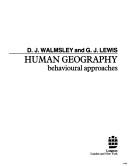
ISBN: 0582300916 9780582300910 Year: 1984 Publisher: London Longman
Abstract | Keywords | Export | Availability | Bookmark
 Loading...
Loading...Choose an application
- Reference Manager
- EndNote
- RefWorks (Direct export to RefWorks)
Environmental psychology. --- -Anthropo-geography --- Cognitive ergonomics --- Ecological psychology --- Ecopsychology --- Ecotherapy --- Environmental social sciences --- Human factors science --- Psychoeology --- Ecological Systems Theory --- Algemene Werken. --- Social geography --- Human geography --- Environmental psychology --- Philosophy --- Methodology --- Geografie --- Methodology. --- Philosophy. --- Sociale geografie --- Environmental quality --- Psychology --- Psychotherapy --- Psychological aspects --- Géographie humaine --- Psychologie de l'environnement --- Philosophie --- Méthodologie --- Human geography - Philosophy --- Human geography - Methodology --- Geographie de la perception --- Psychologie de l'environnement. --- Philosophie. --- Méthodologie.
| Listing 1 - 10 of 12 | << page >> |
Sort by
|

 Search
Search Feedback
Feedback About UniCat
About UniCat  Help
Help News
News